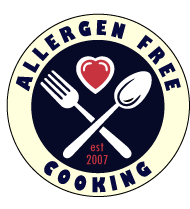No.
Allergen Free excludes IgE-mediated antigens, and rotationally limits IgG-mediated antigens from the daily diet; all food is prepared for the individual in a way that it most appealing, nutritional in content, and with the least allergenic-potential.
Dietary restriction is an effective treatment for many chronic, destructive immune dysfunctions. Dietary restriction must, in the very least, be monitored by a qualified, Medical professional licensed in their area of practice. Ideally, it is a diet based on avoiding known, defined allergens should be tried, with close self-monitoring, to scientifically demonstrate overall improvement in physical, physiological, and most definitely mental health.
Gluten Free excludes wheat, barley, and rye from the daily diet. A strict adherence is vitally necessary for those who are diagnosed as have Celiac disease; a serious, life-threatening autoimmune disorder.
However, gluten free is implicit when considering allergen free. Allergen free means the daily diet is based on the immunological profile of each individual.
Allergen Free always excludes:
Egg yolk, egg white: 2 distinct proteins that should be separately tested for Ig-mediated immune response.
Dairy/Casein/Lactose: 3 Ig-mediated events that should be separately tested for immune response.
Wheat/Gluten: 2 distinct proteins that should be separately tested for Ig-mediated response. "Wheat Free" only means the product excludes wheat grains - so barley, rye and oats can be present (not okay for a Celiac who would react to the gluten in the barley, rye, and cross-contaminated oats). However, gluten free does indicate wheat free.
Soy, soy lecithin: this allergy may also include all other legumes, such as green peas, garbanzo beans, green beans, etc. Can cross-react with peanuts (a legume), pea protein, and guar gum. Soy appears in vitamin supplements as Vitamin E or mixed tocopherols, and is also used as a preservative in cereals and as an emulsifier in chocolate.
Peanuts: Ig-G mediated response is to Aspergillus molds so citric acid (derived directly from Aspergillus niger mold) is also excluded.
Tree Nuts: almond (an apricot), cashew (an apple), tree nuts: pecan, walnut, hazelnut (filbert), brazil nut, hickory nut. Most people also exclude coconut solids - some allow coconut oil due to its healing qualities.
Seeds: Sesame seeds are the most common, sunflower seeds are becoming the replacement to peanuts.
Fish: allergy is to usually to specific class of fish, such as white fish, (cod, haddack, pollock, white fish); causes digestive distress, muscle pain, inflammatory process is initiated. The Ig-mediated immune response is most often due to the lack of proper enzymes to breakdown the muscle protein of the fish flesh.
Shellfish: this is an allergy is to ALL crustaceous creatures, including snails and grubs; lobsters are on the same genetic tree as cockroaches. These proteins are very hard on the liver - a lot to detoxify, chance of bacterial poisoning or heavy-metal exposure must be considered.
Other common foods that may illicit an allergic response in many individuals:
Corn (including corn flour, cornstarch, and corn syrup)
Yeast (active dry yeast as well as Nutritional yeast and Baker's yeast)
Sugar - in any form.
Nightshades (potato, tomato, peppers, eggplant)
Allium family (garlic, onion)
An elimination diet should be employed to isolate and identify trigger foods. An elimination diet must be strictly followed for accurate results. A basic elimination diet should be at least 6 weeks in length.

No comments:
Post a Comment
Collective Mind = Solutions